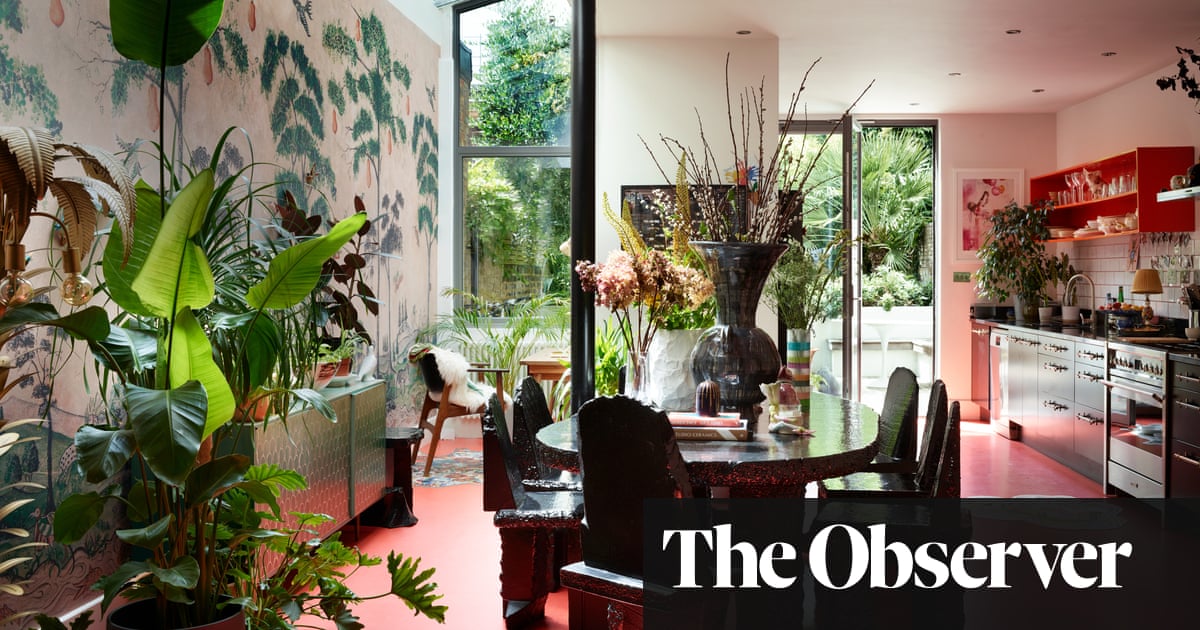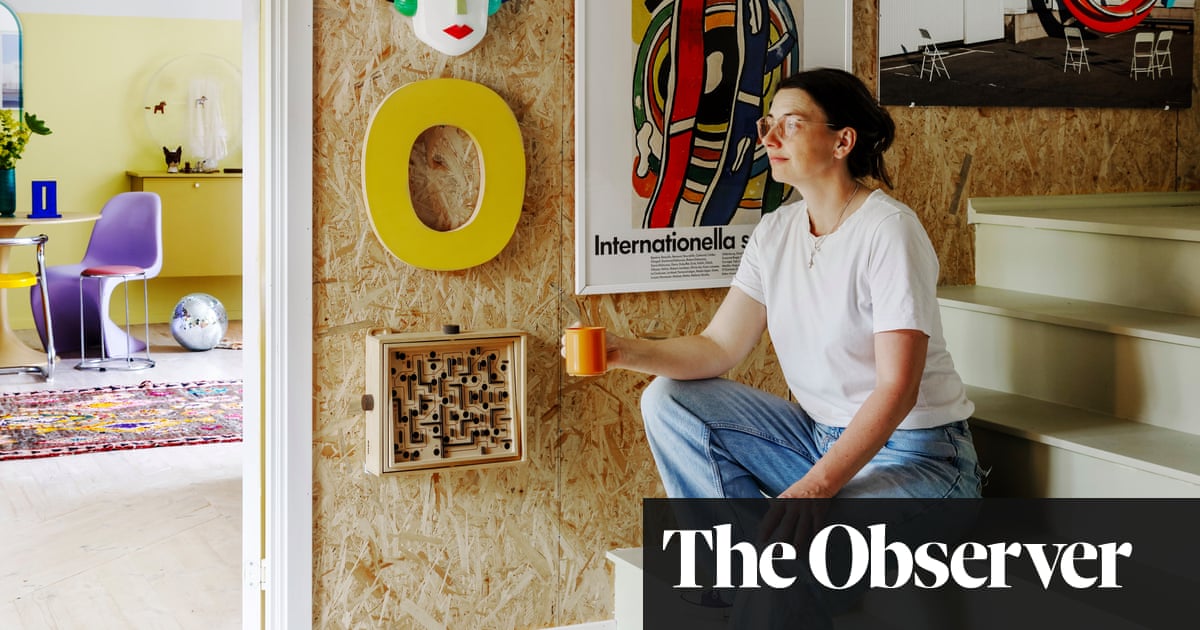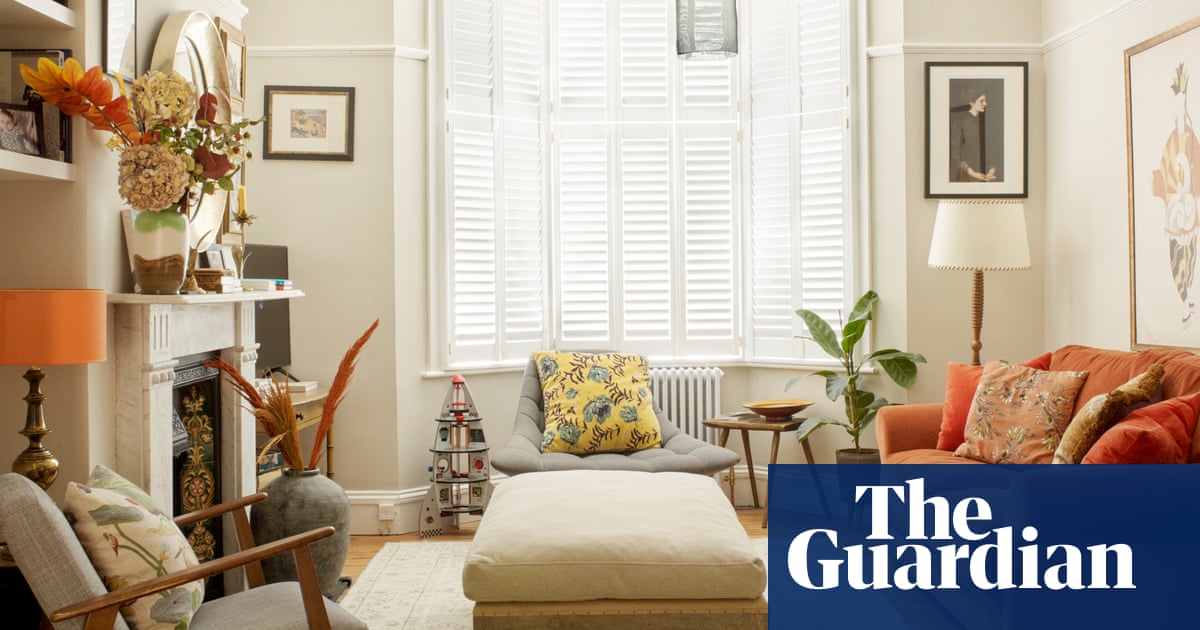
On a shelf in the sitting room of Emily Johnson’s west London home sits a tangerine. Its skin is pocked and waxy-looking and appropriately citrussy. On closer inspection, however, it seems a fraction too glossy, and a quick squeeze confirms it is glazed earthenware. Johnson had the piece made by her ceramics company, 1882, in honour of Glasgow-born artist Bruce McLean, with whom she and her team in Stoke-on-Trent have collaborated for the last few years. “His theory,” she explains, “is that if, when you’ve finished a piece of work – a sculpture, a painting, whatever it may be – you put a tangerine on it or near it, and the piece sings, then it’s passed the tangerine test.”
Johnson has applied that test, albeit on a larger scale, throughout the ground floor of her Victorian terrace. An expansive rear extension incorporates the kitchen, whose tangerine-hued shelving unit was made by the same Stoke-based craftsmen who provided the V&A with bright orange plinths to display a collection of vessels and platters by McLean in 2017. Ditto two console cabinets in the adjoining double reception room. And then there’s the resin kitchen floor, which, if not quite tangerine, is what you could call “tangerine-adjacent”.
And, boy, does the rest of it sing – with a full mariachi band in accompaniment. “I call this the Mexican fiesta,” Johnson says of the hot pinks, reds, greens and blues she’s employed through the house. Having moved here while heavily pregnant in March 2020, she credits both the birth of her son, Jake, and the interminable days of lockdown with her desire to “have some fun” on the colour front. “And could it be something to do with age, and just thinking: ‘Why not?’”
The results are bold, but not unconsidered. Two framed prints of paintings by Sandra Blow hang on the sitting room’s emerald-green walls, the lime of their brushstrokes picked up in the cornice, which Johnson had painted a brighter shade than the walls. Blow’s abstract strips of colour find an echo, too, in a Boucherouite rug from Larusi on the floor. There’s a similar interplay between the Moroccan carpet next door and a large, yellow-ground canvas by McLean (a flash of tangerine in one corner, naturally), which has a particular resonance for Johnson. “My mum died in 2015 and left me some money, and I bought that from Bruce a year later, so that was a proper investment.”
All this provides a fitting setting for the pieces that emerge from 1882’s factory – what Johnson calls “the weird and the wonderful”. Though she comes from good potteries stock – four generations of her family precede her in the industry synonymous with Stoke, beginning in the year for which her brand is named – Johnson spent nearly a decade in Los Angeles selling TV advertising before returning, via a postgraduate diploma in architectural interior design, to her ceramic roots. Since founding 1882 in 2011 with her father, Christopher Johnson (formerly production director at Wedgwood), she has created collections with artists and designers including Paul Smith, John Pawson, Barnaby Barford and Faye Toogood, many of whom had never before worked with ceramics. Centre-stage on the kitchen table is a huge, amphora-like vase designed by the New York-based photographer Martyn Thompson, whom Johnson approached ‘because I loved his use of colour and light’. Evidence of these collaborations is everywhere. “This is where the seconds come to die,” Johnson comments (in which case they’re having a lively afterlife in these surroundings). On one side of the kitchen, where Johnson has further enlivened a Kit Kemp wallpaper with some ceramic ducks in flight (an eBay buy), a pair of precariously tall jugs by McLean – sculptures, really – are here because “they blew up in the kiln. That’s the problem in this business, anything can go wrong”. They look faultless to my layperson’s eye, as do examples of creamware by the American potter-gardener Frances Palmer [https://www.francespalmerpottery.com/pages/about-us], and a hand-modelled cylindrical vessel bySnarkitecture .
Even beyond ceramics, it’s hard to find much that doesn’t link to Johnson’s working or personal relationships. The kitchen table and chairs – all black and craggy, like volcanic rock – were made for her by furniture designer Max Lamb. Though polystyrene and rubber and monumental by comparison, the visual connection with the bone-china tableware he created with 1882 is immediately apparent. A jade-coloured cabinet with brass marquetry is by the designer Bethan Gray , as are a pair of yellow and orange leather-covered side tables in the sitting room. In the hallway, a large photograph by Thompson eyeballs a Michael Anastassiades pendant light, while the former’s distinctive palette of greys and blues reappears in one of his fabric designs in Jake’s bedroom upstairs.
‘I made curtains with it during lockdown,’ Johnson says. ‘All I did was turn it and stitch, so they’re not brilliantly done, but still…’ An assortment of objects on the shelf above Jake’s bed includes souvenirs from Johnson’s own childhood: a tiny pair of red wellington boots and a wooden steam train made for her by her brother. ‘Everything with me has these little bits of connective string,’ she says.
Friends and family have been encouraged to leave their mark in the downstairs loo, which Johnson lined with blackboard paint before letting visitors do their worst with chalk. Resulting graffiti ranges from the predictably scatological (“Shit just got real”) to more personalised witticisms (“Shake your Johnson”) and inspirational imperatives (“Raise your words not your voice”). Does anything ever get rubbed out? “No,” says Johnson. “Well, except for something written by an ex-boyfriend.” He clearly didn’t pass the tangerine test.












